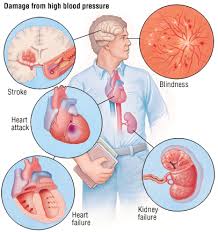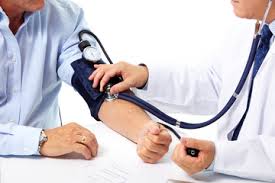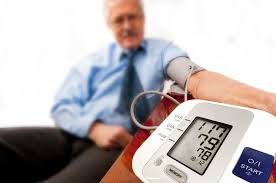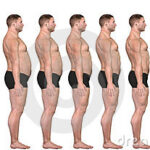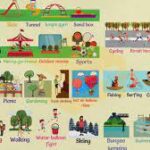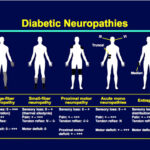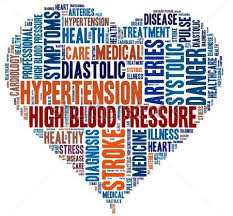 Checking the blood sugar is as common as checking ones blood pressure these days, but is not done as frequently though. There may be no symptoms at all related to high blood pressure or there maybe headache, giddiness or even shortness of breath. Some may present with severe headache or paralysis of one side of the body with a slurred speech or chest pain as part of a massive heart attack.
Checking the blood sugar is as common as checking ones blood pressure these days, but is not done as frequently though. There may be no symptoms at all related to high blood pressure or there maybe headache, giddiness or even shortness of breath. Some may present with severe headache or paralysis of one side of the body with a slurred speech or chest pain as part of a massive heart attack.
Having high blood pressure undetected and untreated over a long period of time, can put a strain on the important organs such as the heart, kidney, brain and eyes.
Blood pressure, diabetes mellitus and high cholesterol levels are like close friends. These all are affecting the blood vessels and having one can put you at risk for developing the other two.
Blood pressure is the pressure of the blood in the blood vessels which help propel the blood forward from the heart to different parts of the body carrying oxygen where needed and also carrying away the waste products from the kidneys and liver.
Blood pressure is recorded by a machine called sphygmomanometer in which a mercury expansion is measured. This is operated only by health care professionals as you have to hear the sounds to decide the blood pressure.
Now-a -days, digital blood pressure machines are available. The ones measuring the blood pressure by inflating the cuff around the arms is preferred. The ones measuring around the wrist is not reliable. The digital machines can be battery operated and or AC/DC operated. The batteries have to be removed after each check to prevent the leak of the batteries while kept inside for indefinite periods of time. There are two readings for the blood pressure, called systolic for the top reading and diastolic for the lower reading. So if the doctor tells your blood pressure is 130/80 mm it means, 130mm is the systolic and 80 mm is the diastolic reading.
The blood pressure can vary with the position, posture, soon after exercise, soon after driving, and even for some when they come to the hospital or clinic due to anxiety. It is wise to check the blood pressure after relaxing for some time. For those where anxiety visiting the hospital causes high readings, it is wise to have the blood pressure recorded at home with a machine and make a set of readings for a week and have the doctor analyse that. There is a devise which can be connected to the upper arm for 24 hours ( 24 Hour ambulatory Blood pressure monitoring) which will measure the blood pressure every 20 minutes even during sleep and activity and have the data downloaded. Keep the arms straight while the cuff is inflating to avoid errors in the machine reading. For some, the blood pressure is highest while at work, for some it is highest at night. Mental and physical stress plays a major role in fluctuations of blood pressure levels.
Pregnant women may get high blood pressure readings which are treated with some specific medicines as they will not cause harm to the growing baby. The blood pressure spike is usually associated with swelling of the feet and proteins in the urine. Some even get blurred vision.
Normally a doctor will not start medications for blood pressure based on one reading. An average of readings which show a persistent set of high levels will decide. The blood pressure can be high even for children in those having some diseases of the kidney. The cuff diameter is different while measuring the blood pressure for children and for those who are obese. The normal blood pressure readings are between 120-140 systolic and 70-90 diastolic. Generally the elasticity of the blood vessels is lost as one advance in age and so the blood pressure can be slightly high for the elderly and hence a level of 140/90 mm Hg is normal for the elderly.
What can be done from your side:
- Avoid stressful situations as much as possible. Learn relaxing techniques such as doing something you like or meditation or just relaxing on a rocking chair, or listening to songs or reading a book or enjoying a swim or watching a movie.
- Incorporate a healthy lifestyle which includes at least 150 minutes of physical activity a week and a diet in which salt consumption is reduced. Sausages, sauces, tinned vegetables , olives soaked in brine, potato fries all come with salt. Use of rock salt is better or low sodium salt is another option. One can use lemon or vinegar to add a salty taste without actually adding salt. Among the exercises, Tai Chi, Yoga, swimming, skipping rope, aerobics, walking, cycling, golf, playing shuttle badminton or tennis if it is okay , are good options. Enjoy the exercises sessions.
- Avoiding spicy and oily food helps.
- Take plenty of vegetables, fruits depending on diabetes levels, non roasted and non salted nuts, fish and chicken and lean meats.
- Avoid too much of caffeine
- Maintaining a normal weight is equally important.
- Limit alcohol consumption– for males 21 units a week and for women 14 units a week ( one unit is half a pint of beer, a glass of wine or a single measure of spirits)
- Cigarette smoking is another thing to be careful of. Smoking can make the blood cells stick together which can help form blocks and also increase the chances for a block in the blood vessels. There are ways to stop smoking by using various nicotine replacement techniques such as nicotine chewing gum, lozenges or patches.
- Be regular in your visits to the doctor.
- If there is a history of high blood pressure running in the close family ( parents or uncle and aunt), have the blood pressure monitored. If your parents have had either a stroke ( paralysis of one side of the body) or a heart attack at an earlier age ( below the age of 50) you have to be careful.
- If you are overweight or obese ( having a body mass index of more than 25) or having diabetes, you have to check the blood pressure.
Treatment
This involves the basic essentials such as reducing stress levels, stop smoking and alcohol consumption, reducing excess salt intake, maintaining a healthy diet, exercising regularly and having a check up on time.
When the above measures do not work or if you develop some complications such as problems with the kidneys, heart or brain, medicines are prescribed.
The eye doctor looks into the eye and checks for early changes in the blood vessels on the retina which needs you to be starting treatment soon to prevent further damage to the eyes.
There are certain basic tests which are necessary such as checking the haemoglobin, sugar, cholesterol, kidney, liver, urine for leak of proteins, ECG and ECHO for the heart, an eye check up and further tests if anything is amiss and needs further evaluation. Some need a scan of the brain if there has been a stroke.
Some people need one medicine and some need more than one medicine. There are different medicines coming in different strengths. The number of mg of each tablet does not reflect upon the severity of the blood pressure. The doctors decide which medicine based upon the kind of protection needed. Some need to have additional protection to the heart and kidney, some need to have their heart rates reduced, some need to have their feet swelling reduced, some need to have the pressure in their kidney reduced and so forth. The aim is to bring down the blood pressure to normal without causing further damage.
As with all tablets, there are some side effects with the medicines for blood pressure. Some may cause slow heart rate, some cause swelling of the feet, some cause coughing and throat irritation, some cause electrolyte disturbances and some medicines are not tolerated well. The dose of medicines has to be adjusted based on individual needs. Generally, once you are on medicines it must be continued for life. But, having a metabolic surgery ( bariatric surgery) can help avoid the need for a medication. This will help control the diabetes, blood pressure as well as your weight. If the blood pressure is solely due to increased stress levels, change of job or relocation will help cure the blood pressure as well.
Many people delay the initiation of treatment despite the medical advice. This is putting your life in danger as changes once they occur, in important organs, are difficult to reverse. It is much better to control the blood pressure than having a massive heart attack or a stroke and put your family or yourself at risk.










